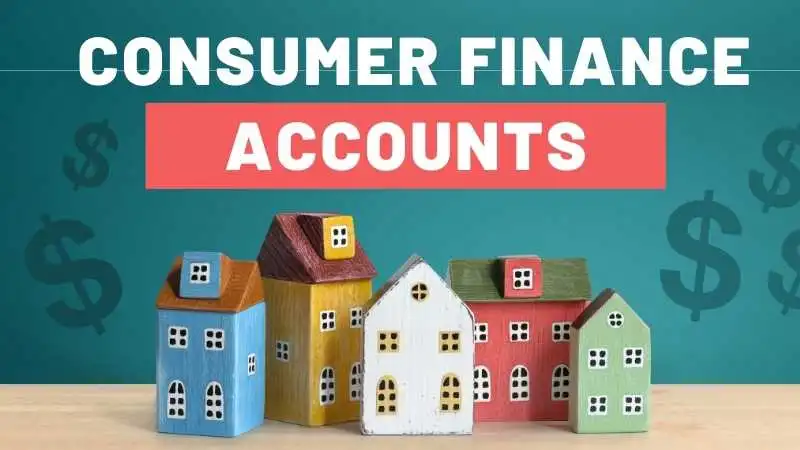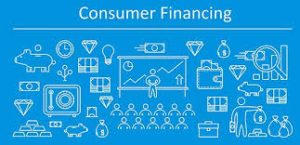What is a consumer finance account and Its Types

Consumer finance accounts can be a convenient option for purchasing items that are beyond your immediate affordability. However, it is crucial to exercise caution and avoid these accounts unless you are confident in your ability to make the repayments. The high interest rates associated with these loans can lead to substantial debt accumulation in a short period of time. Therefore, it is essential to conduct thorough research, carefully assess the terms of the loan, and fully understand the repayment schedule. Knowing the total amount you will end up repaying allows you to evaluate whether the purchase is worth the additional cost. It is vital to make informed decisions to avoid financial strain and potential difficulties in the future.
What is a consumer finance account?
Consumer finance accounts, also known as consumer finance loans, are subprime loans offered to individuals with less-than-perfect credit scores. These accounts serve as an alternative for those who have difficulty obtaining traditional loans or credit cards. However, they typically come with higher interest rates due to the higher risk associated with such borrowers.
Consumer finance accounts can be used to finance various purchases, including automobiles, furniture, or debt consolidation. They can also serve as a means to improve credit scores if used responsibly. However, caution is necessary when considering these loans, as they can be enticing and potentially lead to a cycle of payments and increased costs over time.
It is crucial to borrow only what can be comfortably repaid, as taking on excessive debt can lead to financial difficulties and negatively impact credit scores. When used with careful planning and a clear repayment strategy, consumer finance accounts can be a viable option for rebuilding credit.
Consumer finance accounts play an important role in managing personal finances, facilitating transactions, building credit history, and achieving financial goals. The specific features, terms, and conditions of these accounts can vary based on the financial institution and the type of account.
These accounts are designed to cater to the needs of individual consumers and offer various features and services, such as:
- Checking Accounts: These accounts are primarily used for everyday transactions, such as depositing and withdrawing funds, writing checks, and making electronic payments.
- Savings Accounts: Savings accounts are intended for individuals to deposit and accumulate funds over time. They often earn interest on the deposited amount, helping account holders grow their savings.
- Credit Cards: Credit card accounts allow consumers to make purchases on credit, up to a certain credit limit. Cardholders can borrow money from the card issuer and repay it later, either in full or through minimum monthly payments.
- Personal Loans: Personal loan accounts provide individuals with access to borrowed funds, which can be used for various purposes, such as debt consolidation, home improvement, or unexpected expenses. Borrowers typically repay the loan in installments over a fixed period.
- Auto Loans: Auto loan accounts are specific to financing the purchase of a vehicle. Borrowers receive funds from a lender to buy a car and repay the loan over time, often with interest.
- Mortgage Accounts: Mortgage accounts are established when individuals obtain loans to purchase properties, such as homes or real estate. The loans are secured by the property itself, and borrowers repay the loan over an extended period.
Consumer finance accounts, specifically bad credit loan options, can be beneficial for obtaining emergency funding. However, it’s important to note that these accounts often come with high interest rates and short repayment periods. It is crucial to carefully consider your ability to repay the loan on time before opting for such a loan. Another alternative is to focus on improving your credit score to qualify for more traditional loan options.
Characteristics of Consumer Finance Accounts

Here are some key characteristics of consumer finance accounts:
- Individual Focus: Consumer finance accounts are designed for individual consumers, catering to their personal financial needs and transactions.
- Accessibility: These accounts are typically accessible to a wide range of individuals, including those with varying income levels and credit histories.
- Transactional Capabilities: Consumer finance accounts allow individuals to perform various financial transactions, such as depositing and withdrawing funds, making payments, and transferring money.
- Borrowing and Lending: Many consumer finance accounts provide borrowing options, allowing individuals to access credit or loans for specific purposes. This may include personal loans, credit cards, auto loans, or mortgages.
- Interest and Fees: Consumer finance accounts often involve interest charges on borrowed funds and may have associated fees, such as account maintenance fees, transaction fees, or overdraft fees.
- Repayment Terms: Depending on the type of account, consumer finance accounts may have different repayment terms. For example, credit cards may require minimum monthly payments, while personal loans and mortgages have fixed repayment schedules.
- Credit Assessment: Some consumer finance accounts, particularly those involving borrowing, may require a credit assessment to determine the individual’s creditworthiness and eligibility for the account.
- Financial Management Tools: Many consumer finance accounts come with tools and features to help individuals manage their finances effectively. This may include online banking platforms, budgeting tools, spending trackers, and alerts.
- Regulatory Compliance: Consumer finance accounts are subject to regulatory oversight to ensure fair practices and protect consumers’ rights. Depending on the jurisdiction, there may be specific regulations and consumer protection laws related to these accounts.
It’s important for individuals to carefully review the terms and conditions, including interest rates, fees, and repayment obligations, associated with consumer finance accounts before opening them. This allows individuals to make informed decisions and choose accounts that align with their financial goals and circumstances.
18 Best Direct to Garment T-Shirt Printing Companies Near Me
Types of Consumer Finance Accounts
Choosing the right type of consumer finance account is crucial for attaining your financial objectives. Your specific financial goals play a significant role in determining the type of consumer finance account that best suits your needs.
There are various categories of consumer finance accounts that serve distinct purposes. Here are a few notable ones worth highlighting:
- Checking Accounts
- A checking account is a basic consumer finance account utilized for daily transactions.
- It enables individuals to deposit money, write checks, conduct electronic transfers, and withdraw funds from ATMs.
- Key features of a checking account include the provision of a debit card, the ability to write checks, access to online banking services, and the option to make bill payments.
- Savings Accounts
- Savings accounts are designed to securely store money for extended periods while accruing interest.
- They serve as a reliable means to save money, establish an emergency fund, or work towards specific financial objectives.
- Key features of savings accounts include the ability to earn interest on deposited funds, convenient access to the money when needed, and limitations on the number of withdrawals allowed per month.
- Certificates of Deposits
- Certificates of Deposit (CDs) are time-based deposits offering higher interest rates compared to regular savings accounts.
- CD accounts require account holders to keep their funds untouched for a predetermined period.
- Key features of CDs include fixed interest rates that remain consistent throughout the deposit term, penalties for early withdrawal before the specified period ends, and varying options for term lengths.
- Money Market Accounts
- Money market accounts are a combination of checking and savings accounts, offering certain characteristics of both.
- These accounts generally provide higher interest rates compared to regular savings accounts.
- Key features of money market accounts include the ability to write a limited number of checks, accrue interest on deposited funds, and have higher minimum balance requirements compared to traditional savings accounts.
- Credit Card Accounts
- Credit card accounts enable consumers to make purchases on credit, with the obligation to repay the amount by a predetermined due date.
- These accounts frequently offer a range of rewards and benefits to cardholders.
-
Credit limits, rates, rewards, and minimum payments are key features of credit card accounts.
- Personal Loans Accounts
- Consumer finance accounts allow individuals to borrow money for different purposes, such as home improvements, education expenses, or consolidating debt.
-
Offer fixed or variable interest rates, defined repayment terms, and credit limits for borrowing purposes.
How to Manage Consumer Finance Accounts Effectively:
Consumer finance accounts are vital for effective personal financial management. Whether you aim to save for the future, handle daily expenses, or borrow for significant milestones, comprehending the various account types and their advantages is crucial.
Having the knowledge and ability to effectively manage your consumer finance accounts is essential for your financial journey and plays a significant role in improving your overall financial stability.
- Establish a budget to effectively monitor your income and expenses, ensuring that you can meet your financial goals and obligations.
- Consistently contribute to your savings accounts to build an emergency fund and achieve your desired financial objectives.
- Utilize credit card accounts responsibly, paying off outstanding balances promptly to avoid incurring high-interest charges.
- Vigilantly monitor your accounts for any signs of fraudulent activities or errors, promptly reporting them to your financial institution.
- Consider seeking professional financial advice to create plans for retirement, investments, and other long-term goals.
- Regularly review your consumer finance accounts to ensure they align with your evolving needs, making necessary adjustments as required.
What is consumer finance company?
Consumer finance companies maintain high-interest rates because they assume risk by lending to individuals with subprime credit scores. Depending on the specific loan and the state of residence, interest rates for consumer finance accounts can range from 30% to 500%. Often, consumer finance loans require collateral, also known as secured loans. Loan amounts typically range from a few hundred to a thousand dollars, as these companies aim to ensure borrowers can handle repayment.
Consumer finance accounts generally offer short-term loans, with repayment periods ranging from a few weeks to a year. If you require a longer repayment term, such as for auto loans or home equity loans, consumer finance accounts may not be suitable.
What is a consumer finance company account?
A consumer finance account is a loan or account that allows you to make purchases by spreading out the payments over an installment plan. Instead of paying the full purchase amount upfront, you make regular payments, including interest, until the entire balance is cleared. Consumer finance accounts are commonly utilized when customers cannot afford to pay for an item in full at the time of purchase. This arrangement benefits both the customer, who can access the item immediately, and the seller, who can make the sale. Meanwhile, the financing company benefits from the interest charged on the original purchase price.
1. Aspen Commercial Lending
9896 Rosemont Avenue
Suite 204
Lone Tree, CO 80124
Phone: 844-856-1960
Fax: 844-517-4567
Email: info@aspencommerciallending.com
To establish your credit card program and incorporate alternative payment methods into your business, consider using consumer finance services provided by Aspen Commercial Lending. Get in touch with us now to obtain further information about this offering and initiate the application process.
Below are some ways in which integrating a credit card program can positively impact your business:
- Immediate credit decisions
- Build awareness for your brand
- E-signature
- Secure transactions
- Marketing support
- Electronic applications
2. Real Business Ltd., UK
Sales Team
+44 (0)20 3411 8522
advertising@realbusiness.co.uk
Real Business was established in 1997 and has experienced parallel growth with the entrepreneurial drive in the United Kingdom. As a small and medium-sized enterprise (SME) ourselves, we have navigated the necessary steps to reach our current position as the most widely read business source in the UK. Their platform is dedicated to providing transparent insights into the realities of SME life.
If you are a newly established startup or a relatively inexperienced entrepreneur seeking success in the business world, we offer a plethora of valuable information and guidance to help you quickly adapt to the intricacies of business operations.
FAQs:

Why Are Too Many Consumer Finance Accounts Bad?
Having multiple open consumer finance accounts simultaneously can negatively affect an individual’s credit, giving the impression of financial instability and overextending oneself financially.
Accumulating multiple consumer finance accounts can make it challenging to obtain future loans and approvals for leases or rental agreements, so careful consideration is advised.
When applying for a car loan, car dealerships scrutinize your credit report. If it contains numerous consumer finance accounts, securing a loan at a favorable interest rate may become difficult.
If a car loan is your sole source of credit, the presence of numerous consumer finance accounts can create significant challenges.
Consumer finance accounts offer an intriguing alternative to traditional bank accounts, aiding in cash flow management and providing access to funds in situations where traditional banking is not feasible.
Nonetheless, consumer finance accounts can pose high risks if they are not used as intended, such as a temporary means to improve one’s financial situation or as a short-term solution to enhance purchasing power through improved credit history.
Why do too many consumer finance companies account for bad?
Having too many consumer finance company accounts can be detrimental for several reasons:
- Each time you open a new account, it can temporarily lower your credit score due to the credit inquiry and the potential increase in overall credit
- It may lead to missed payments, late fees, and accumulating debt, causing financial strain.
- This can negatively impact future loan applications or the ability to secure favorable interest rates.
- Having multiple accounts can tempt individuals to spend beyond their means, leading to increased debt and financial instability.
- With numerous accounts, it becomes more complex to monitor and track expenses, making it harder to maintain an accurate overview of your financial situation.
What is a consumer finance company loan?
A finance company is a specialized financial institution that provides credit for consumers to purchase goods and services. They do this by either purchasing time-sales contracts from merchants or directly granting small loans to consumers. Consumer finance companies primarily focus on offering personal loans to individuals and are regulated by state small-loan laws. While the specific details of these laws may vary across states, they generally share similar content and coverage.
What do too many consumer finance company accounts mean?
What it indicates is “too few accounts currently paid as agreed.?”
Having too many consumer finance company accounts could indicate a couple of different scenarios. It may suggest a history of late payments or unpaid accounts in your credit report. On the other hand, it could indicate a lack of credit accounts, such as credit cards, loans, mortgages, or other credit lines, which demonstrates a positive payment history. To address this situation, it is crucial to prioritize payment history. Make sure to pay your credit card bills in full and on time to bring your accounts up to date. If paying the entire balance is not feasible, strive to at least make the minimum payment each month.
Is Affirm a consumer finance account? explain
Affirm offers a convenient payment option that allows you to make purchases and pay over time without fees, helping you stay within your budget. When you sign up for an account, Affirm conducts a soft credit inquiry to assess your eligibility for future purchases. This type of inquiry does not impact your credit score or appear on your credit report. However, if you decide to make a purchase, Affirm may perform a hard credit inquiry, which could potentially affect your credit score.
- What’s a consumer finance account?
- What are consumer finance company accounts?
- What are consumer finance companies?
- What are consumer finance accounts?
- 10 Best Small Loan Apps Like Possible Finance
- Big Buck Loans: Apps Like Possible Finance| No Credit Checks
- Is Heart Payday Loans legit?
- Atlas Personal Finance Loan
- Green Dollar Loans Reviews: Apps like Possible Finance
- Viva Payday Loans Reviews: With Instant Decisions
- Barndominium Financing in Six Steps
- What is Digital Transformation in the Banking Industry
- How to Build an Effective Financial Transformation Roadmap
- Digital Transformation in Business: Trend| Future| Benefits
- What is E-commerce Business Intelligence: Tools for BI
- What is Business Process Transformation?
- Business Planning Process and Types of Business Strategy
- Best Financial Digital Transformation Services: Trend | Future
- Everything You Need to Grow Your SaaS Business





